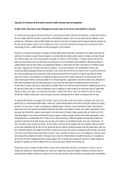Typically, the literature of love tends to present conflict between duty and happiness
In light of this view, discuss how Shakespeare presents duty in this extract and elsewhere in the play
As the title of the play suggests, Measure for Measure is centralised around ideas of balance and equivalence, a notion which produces
the main conflict within the narrative as, where there is the potential for balance, there is also an opportunity for imbalance. In this
problem play, Shakespeare creates parallels between the monarchical transition in England and the temporary abdication of power by
the Duke, the play explores themes such as freedom and restraint, crime and punishment and chastity, all of which provide tension
and arguably, at times, a conflict between the duty and happiness of the characters.
The Duke is a character that generates vast debate, the interpretation drawn of the Duke is imperative to the reading of the play. The
motives of his transition in power remains enigmatic, his uninterrupted and lengthy speech stating his intention to remove himself
from ‘millions of false eyes’ raises many questions; especially as he claims to ‘love the people’ . It would be viable to infer that the
Duke has grown tiresome of his role with many critics going as far as to say the Dukes motives behind his abdication are due to a
conflict between duty and self discovery, this psychological dilemma is evident when the Duke is observed to sit ‘transfixed, staring
into space’ suggesting that the Dukes step down from power is a necessary component to the sustainability of Vienna, with
renaissance political philosophy believing the state and its ruler are one and the same and an ailment in one is an ailment to the other,
this could also explain why ‘the law hath slept’ under the governing of the Duke. The syntax in his speech may reflect the mental
unease of the Duke or the breakdown of a traditional working of state with both readings allowing for the interpretation that the
Duke’s duty to govern Vienna is producing conflict to his personal happiness, supporting the view that a conflict exists, although, this
then raises the question of why the Duke would pass on such a duty if he understands the emotional burden it carries with it.
Furthermore, the nature of the extract itself expresses the Dukes desire to live ‘the life removed’ despite the contradictions this has to
the concept of divine right, this could be Shakespeare's way of indulging in a genre unique to the transitional state of England often
labelled as ‘absent ruler’ plays as Lucio describes the Duke as a ‘Duke of dark corners’ which can reiterate his desire to remove
himself from ‘millions of false eyes’ or pave the way for an ulterior interpretation of his motives to step down from his duty.
An opposing interpretation may suggest that the Duke’s step out of the public eye has more sinister connotations with some critics
painting him as a machiavellian powermonger, harbouring a cavalier attitude towards the casualties of Angelo’s regime and moving
unseen in his ‘dark corners’ in order to manipulate the unfolding events in Vienna. It can be stated that the Duke’s substitution of
power wasn’t due to the overbearing emotional implications but rather to test Angelo’s character, this could be interpreted in one of
two ways; that the Duke felt a duty to expose Angelo’s true nature and see ‘if power change purpose, what our seemers be’ or the
Duke knew Angelo’s true character and allowed his abuse of power in order to provide a solution and to then be portrayed as a hero,
saving Vienna from an authoritarian ruler, the former more clearly presenting a conflict of happiness and duty however both raise
questions of the ethics of the Duke leaving a man he views with suspicion ‘to the hopeful execution’ of his own ‘commissions’. The
latter presenting a more complex and sinister role of the Duke, a view that would be popular with an Elizabethan-Jacobean audience
as the Dukes assimilation into the role of a Friar paired with the anti-catholic sentiment prevalent at the time would adhere more to a
post-reformation audience who would view the Dukes character and actions with suspicion. Shakespeare gives the Duke a very active
role in the second-half of the play, dominated by the Dukes covert surveillance of Vienna, he has a role analogous to a dramatic writer
which allows him to influence the events in the play, he has a key role in the perseverance of Isabella's chastity as he manufactures
the bed trick, the Dukes manipulation of the narrative suggests that his transference in power was not due to a conflict between his
duty and his happiness but rather to allow him to carry out his own means, hidden from the public eye.
Shakespeare presents a paradox through Isabella’s chastity and her imperitivity to the play’s sexual dynamic, In order to save her
brothers life, Isabella must sleep with Angelo. As a novice nun, Isabella has a duty to the religious institution she wants to enter to
remain abstinent; however, Isabella has to balance this with the duty she feels to save her brother, thus presenting the moral paradox.





